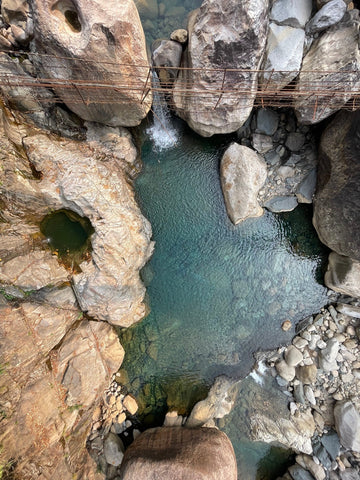No Products in the Cart

This recent quest to learn more about the origins of tea in India, spanned two weeks from end of February to March 2023, was a very special experience. It gave us so much insight into the history of Indian tea before British colonization and what is likely the new future of Indian tea.
After a brief stop over in Mumbai, we flew to Assam and made our way to meet Rajesh Singpho makes this tribal tea called phalap, a traditional tea stuffed in a bamboo and aged over the hearth of their hut. It was wonderful to talk with him and learn that the Singpho tribe migrated from the Yunnan province in China. As the entire of geography of the north east India has always been similar to Myanmar and China, there still are wild tea trees in the area. The Singpho tribe has been making phalap and keeping traditions alive for many years. Although now instead of using wild tea trees they have switched to more cultivated tea plants for their leaves for the purpose of ease. Over tea, fermented tea leaf salad, rice beet and traditional meal we enjoyed community and a unique experience of learning how tea was native to India much before British colonization and how tribes are still trying to keep its culture alive.


After meeting Rajesh Singpho, there was a bit of a detour to go birding at a national park in Arunachal Pradesh. There is so much of biodiversity in India that we could not resist a hike into nature to come up close to wildlife. We saw multiple birds and even a family a Hoolock gibbons.


This was followed by another long drive to a different part of Arunachal Pradesh where the Tangsa people, a part of Naga tribe live. We met the Tangsa tribe in their village of only 8 huts and learned how they migrated far from Myanmar. They brought with them wild tea plants that they then planted in their backyard and each family has about 6 to 10 of these wild tea trees. Here we were able to see how khalap is made and the whole process was fascinating! More to come on phalap and khalap in the next blog.


After meeting the Singhpo and Naga tribes we spent time with our small, organic tea grower in Assam Maddhurjjyya. Over cups of tea and treats we discussed the batches we would like from him during 2023. His Assam Black Gold made with organic methods is wonderful and much loved by our customers so we would suggest you give it a try.


After 4 days in Assam we traveled to its neighboring state Meghalaya. This journey took a day as Assam is a very big state. Meghalaya was again adventure, hikes and a visit to our tea growers whose 8 acre tea farm is up a hill by the Umiam Lake. This tea farm is where our beautiful and ethereal Meghalaya Silver Needle and Meghalaya AutumnalTwist grow. Assam which is in the lowlands, is home to the camellia sinensis assamica varietal and the terroirs help give a bold, malty and rich mouthfeel while Meghalaya with its rolling hills, has a terroir that is suitable for the growth of Camellia sinensis sinensis varietal and so has flavors and aromas similar to Darjeeling tea.


After the visit to the tea garden we carried on to a visit the farmers who make our very special turmeric called Lakadong turmeric. This special turmeric makes our golden lattes unique and irresistible for all who try it. The terroir of the hills where the turmeric grows makes it earthy and less pungent so everyone loves it. It also has a 2-3 times higher curcumin content that helps reduce inflammation. Although we just missed the harvest season we know we will back sometime soon to experience it. Try our Cleansing Golden Latte and Calming Golden Latte and decide for yourself.
After our tea adventures we took a few days to explore beautiful Meghalaya. This included a 10 mile hike and 13,000 steps to the Double Decker Living Root Bridge and Rainbow Falls. For those who are not aware, Meghalaya is one of the regions that gets the highest rainfall in the world. People for centuries have been making living route bridges across rivers to commute. These are made over years and created naturally by weaving roots of trees together.


I hope you enjoyed our tea travel story, we really enjoy going to the most remote parts of India to meet small farmers, learn more about the history of tea and bring back innovative and the most flavorful batched for you to try. What you enjoy when you sip one of our teas is not only most premium Indian tea, but also an authentic Indian tea experience to the origins of tea and tea culture.
Our travels make us often wonder what would have happened to Indian tea if the British had not colonized India and tea was not grown as a commodity. Likely there would have been an absence of commodity mediocre tea, lack of exploitation of tea pluckers and the traditional practices would have then given rise to really highly quality tea over time. British colonization probably set back premium Indian tea for decades. Commodity tea is usually poor quality, bitter and then one needs to add sugar, milk or artificial flavorings to try to make it taste better. Although a lot of this culture continues post-colonization and what is sold to consumer as Indian tea across the world is really poor quality, at Herbs & Kettles we are trying to change this. By partnering with small tea farmers across India who are into quality versus quantity, innovation and fair pay to their community of tea workers we hope to make a difference in the perception of India tea and to our community of farmers we support.